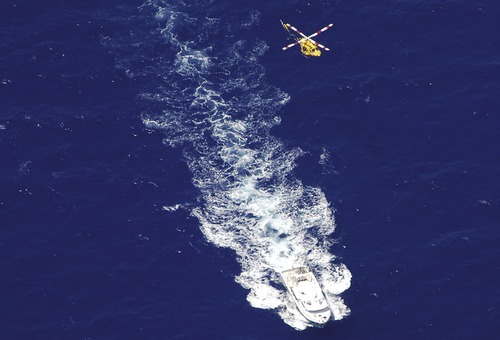CASE 16
 |
Incident
As the medical director of a pre-hospital and retrieval service, you are working a clinical shift in the Emergency Department of a major trauma hospital. A case involving one of your services’ PHR teams arrives by helicopter. At handover, the details are as follows:
• 28-year-old male tourist.
• Accredited open-water SCUBA diving course participant.
• No significant past medical problems.
• Rapid ascent from 15 metres (50 feet) to the surface.
• Waved for help before losing consciousness.
• Assisted from the water to the vessel distressed and short of breath.
• Oxygen applied.
• Ship’s captain radioed for help.
• Winch rescue from vessel.
Relevant information
The PHR team’s handwritten on-scene notes record the following:
Complaining of generalised pain. Cool. Shut down.
GCS 13 (E3, M6, V4). P 118 beats per minute. BP 158/94 mmHg. RR 30. Sa02 94% on high-flow 02.
Few crackles to both lung bases.
On-scene management:
• Intravenous access for analgesia. Morphine to total of 10 mg given.
• No intravenous fluid given in light of ‘wet lungs’.
In flight (25 minutes over water):
• Increasing respiratory distress. Sat up.
• Became ‘unresponsive’ and proceeded to have a generalised tonic-clonic seizure.
• Intravenous diazepam 5 mg administered with good effect.
• Patient then apnoeic and vomiting.
• Difficult emergency in-flight intubation.
On arrival at the Emergency Department, the patient is unresponsive without further sedation. He has bilateral fixed and dilated pupils and is difficult to ventilate, requiring high airway pressures and 100% inspired oxygen. A chest X-ray reveals no pneumothorax. A head CT is requested and the verbal report is as follows: ‘Extensive intracranial intravascular air. Early loss of grey-white differentiation’.
The patient is admitted to the Intensive Care Unit, where he deteriorates further and is declared brain dead 24 hours following admission.
Questions
16.1 Briefly outline the common diving-related emergency presentations.
< div class='tao-gold-member'>
Only gold members can continue reading. Log In or Register to continue
Stay updated, free articles. Join our Telegram channel

Full access? Get Clinical Tree








